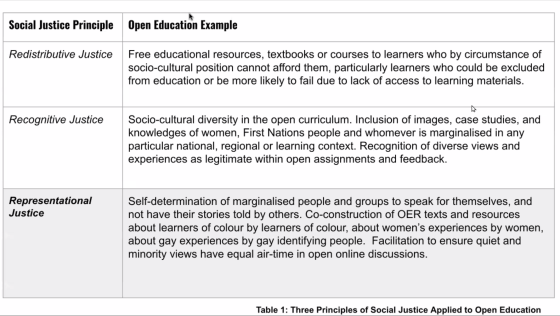|
Getting your Trinity Audio player ready...
|
OpenEd21 is happening this week and instead of tweeting I am blogging from selected sessions I am attending. These notes may be rough as the intent is to try to follow the flow of the talk and publish as soon as possible.
Session Description
In 2021, the New England Board of Higher Education (NEBHE) formed a regional Community of Practice (Co-OP) for faculty to learn about and implement open pedagogy into their courses through Lambert’s (2018) social justice framework. Join Lindsey Gumb, NEBHE’s Open Education Fellow, for a lively panel discussion in which our Co-OP participants share their own candid thoughts on topics like relinquishing their “Sage on the Stage” identities to empower their students as authoritative voices through open pedagogy, anxieties around incorporating discussions of race and white supremacy into their classroom discussions, the benefits of collaborating with regional colleagues, and how/if their students embraced the opportunity to license their intellectual property and contribute to the greater commons. (full abstract)
Presenters: Lindsey Gumb (NE Board of Higher Education), Kathleen Brinegar (University of Vermont), Matthew Ulriksen (Community College of Rhode Island), Suzanne Marmo-Roman (Sacred Heart University), Eric Kulberg (Great Bay Community College), Manu Chander (Rutgers), Daniel Leland (Thomas College), Annette Cuertin (Berkshire Community College), Margret Carroll (CUNY)
Session Notes
Big panel discussion on OER enabled pedagogy built around Lambert’s social justice framework, which has three themes; Redistributive Justice, Recognitive Justice, and Representational Justice. The thrust of the work in this particular group was Respresentational Justice.

This’ll be a bit messy here as there are a lot of panellists and I am not going to catch all the attributions. Questions are from moderator Lindsey Gumb
Q: Can you speak about relinquishing your Sage on the Stage mentality
Quotes from instructors that they have no problem relinquishing the Sage on the Stage role, but have had some pushback from learners who did not understand or appreciate it. One instructor spoke of a student who publically commented that it was “lazy teaching” and “a waste of my time”. The instructor intervened to explain the rationale behind open pedagogy assignments and the student dropped the course. Yet other students have reacted the exact opposite with a “wow, we never did that in high school.” One instructor felt there was a generational distinction between those who appreciate renewable activities.
Q: can you speak about any anxieties about facilitating discussions of racial and social justice in the classroom and is that difficult?
Make sure the environment is safe for students. Keep the conversation civil and respectful. Most instructors are talking about having students create websites as the projects. Students know that the website will be there for next year’s students who will then build upon the work of the previous year.
I asked in the chat about how they go about cultivating safe paces in the classroom and one of the responses was that the instructor set up a journaling activity for the learners and the journal was a private discussion path from student to instructor, which I thought was a very good way to allow students a direct pathway to the instructor.
Another strategy was to start tough discussions in small groups and then widen the conversation.
Q: Can you talk about collaborating with regional colleagues and the benefits of collaborating with regional colleagues on OER-enabled pedagogy.
Diverse levels of experience with OER – some have done OER projects, others have not. We are able to be better instructors by learning about open and, more generally, teaching & learning practice from each other. Ideas can be brought back to other colleagues.
My Takeaway
I have heard about Lambert’s Social Justice Framework before, but this is the first time I have seen a presentation that was focused on the practicalities of implementing it, although it felt like the session focused more on collaborating to create renewable and non-disposable assignments and didn’t really speak about the social justice lens of development to the extent I had hoped. Still, a worthwhile session to hear about how other regional collaboratives are working together to support instructors in developing OER-enabled resources and assignments.
Also, a huge takeaway for me – T.I.L. about Regional Compacts in the US, which is quite amazing considering the work I do. I have known for quite a while about WICHE and their work, but I did not realize that it was a “Regional Compact” or that Regional Compacts were even an organizational thing in the US higher education system. In addition to WICHE, T.I.L. about SREB, NEBHE, and MHEC.
It was clear that there are benefits from instructors collecting regionally to strengthen their pedagogy by learning from each other.
Shifts to renewable assignments and more active learning models are a shift for not only instructors but also students who may come into classes with expectations that they will get a Sage on the Stage model.
